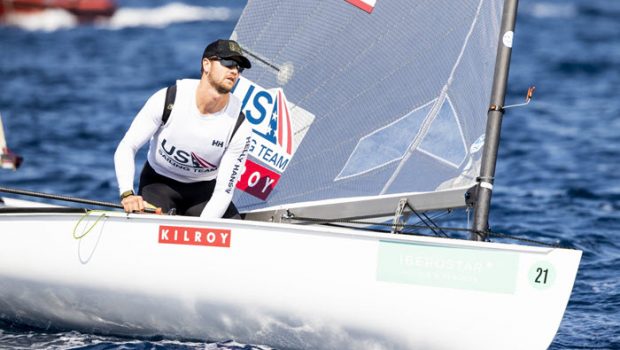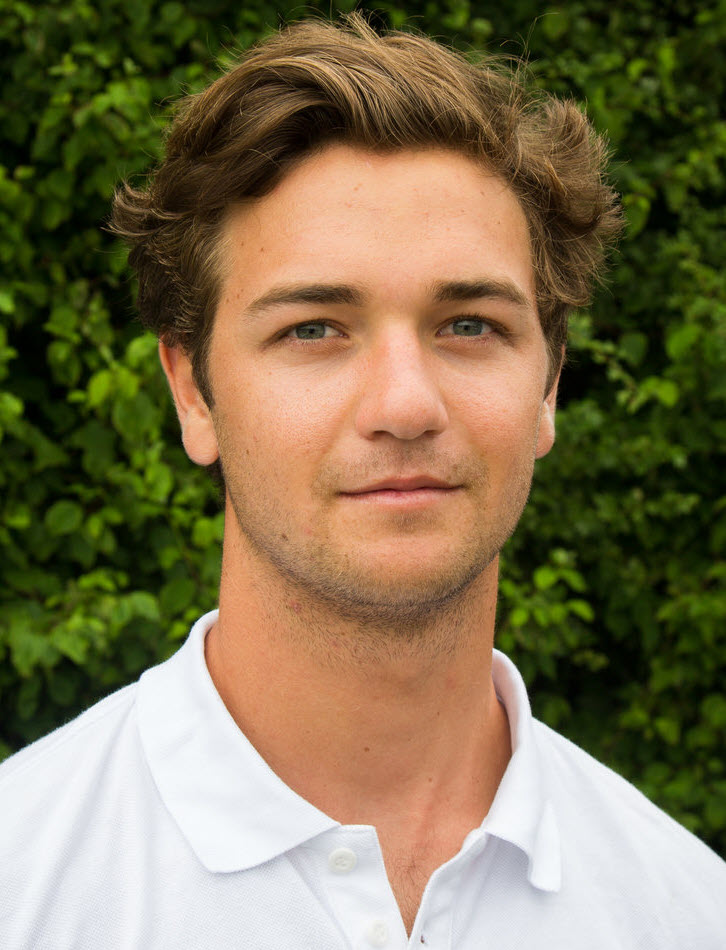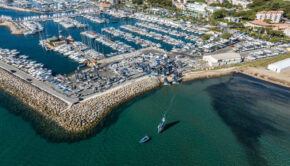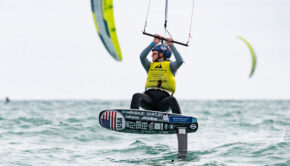Luke Muller: The road to Tokyo 2020
Published on April 20th, 2021
American Luke Muller, who will be representing the USA at the Tokyo 2020 Olympics in the Men’s One Person Dinghy Heavy event (Finn), was profiled in the April 2021 edition of FINNFARE, the official publication of the International Finn Class:
Growing up in Fort Pierce, Florida, just down the road from an Olympic windsurfing medalist, Luke Muller was surrounded by people who loved being in and on the water. When he thinks about attending his first Olympics this summer, he says, “I guess it’s in my blood.”
In Tokyo this July, Muller, 24, will achieve a lifelong dream.
He got the call up to sail at Tokyo 2020 in July, actually from his sister, Meredith Muller Brody, who works at US Sailing as Olympic Manager. It was a special moment.
“It was an incredible experience. We were all crying tears of joy and there was a lot of celebrating.”
Background
“I grew up in a beach town in Florida and my family spent their days surfing and windsurfing. When my older sister, Meredith, started a high school sailing team, the family warmed up to the idea of racing dinghies, and my dad got my brother and I an Opti.
“After learning how to make the thing go where I wanted it to, we would travel three hours at the weekends to sail with the fast kids and I eventually qualified for a few international regattas which is when I fell in love with racing.
“I continued to build my skills through the Laser, and made the switch to the Finn shortly before attending university.”
His claim to fame is that in 2013 he became the youngest ever Laser US National Champion. Eventually he made the transition to the Finn mainly because of his size; he was getting too muscular for the Laser. His first major Finn regatta was in 2015.
“I spent the better part of two years figuring out the boat on my own and with friends but made a big jump in my abilities when Luther and Caleb invited me to Rio in preparation for the 2016 Olympics.”
Of course, Caleb Paine went on to win the bronze medal in Rio, coached by Luther Carpenter.
“From that point on I was under the direction of a great coach and pinned against a very competitive and ruthless training partner.”
From being mentor, Paine soon turned into adversary as the two slugged it out in the early stages of trying to qualify for Tokyo. Muller had come a long way, was gaining confidence at every regatta and was threatening the front of international fleets. He famously won two races at the 2018 Sailing World Championships in Aarhus, but inconsistency in the other races left him trailing Paine.
On those two races, which was the day the Finn course was live streamed, he explained, “I kept it simple and gave all my effort to those races. I knew I was fast in those conditions and trusted myself. It’s as simple as that.”
When the trials for 2020 started, it was almost too close to call. Muller got a jump on Paine with an eight-point advantage out of the December 2019 Finn Gold Cup in Melbourne. At the next event, the January 2020 World Cup Series in Miami, Paine was dominant in the smaller fleet, winning five races and the regatta, to Muller’s third place.
The stage was set for the showdown at the 2020 Finn Gold Cup in Palma, but then the pandemic hit and plans started to change fast.
America’s Cup
Both Paine and Muller were also heavily involved in the New York Yacht Club’s entry in the 36th America’s Cup, American Magic.
Then in June it was Paine, who had qualified the USA for Tokyo at the 2019 Europeans in Athens, Greece, who announced that he was focusing on the America’s Cup and ending his Olympic Finn campaign.
Paine, then 29, had been the only American to win a sailing medal at the Rio Games. He was later named US Sailing’s Rolex Yachtsman of the Year in 2016. He said it was a “very difficult decision”.
In turn, Muller also walked away from the America’s Cup to focus on Finn sailing.
“Of course it was hard to walk away from the only racing that was still on the schedule at the time but I used it as an opportunity to focus all of my efforts on Finns and therefore my sailing abilities.”
The call to Muller from US Sailing followed a month later. He was heading to Tokyo.
“As a racer of course I wanted to win on the water, but this past year has taught us all that things change and we have to adapt. Plus qualifying for the Olympics still felt great.
“I think I made plenty of mistakes but I was confident in myself and believed I could get the job done.
“I kept learning more and more and getting better and better until I won the selection series and was selected for Tokyo. With everything changing due to the pandemic, I had to make some changes and we adjusted our team with a great training partner in Eric Anderson and spent many hours trying to get the most out of the boat.
“I think this last year has been a huge opportunity to step away from the regatta schedule and purely focus on how to make a Finn go fast. That process has been gratifying and I am excited to apply those gains to the race course.
“The Finn is a demanding boat. Physically the Finn requires great effort to make it move as fast as possible, and the racing is top notch with many world class sailors in the fleet. Sailing in a team is fun but in single handed sailing you have to do everything and you are ultimately responsible for what happens during a race and I really like that.
“The Finn and the Finn class have made me a better sailor.”
Postponement
Though obviously concerned by the postponement of the Olympic Games, he was still looking for the positives from the situation.
“Honestly, I was a little worried at first, but in the end it was a huge opportunity to have more time to become a better sailor.
“I learned pretty quickly that it was not the best use of time to make guesses at the schedule. Even now I don’t worry about what will happen. My mantra over the last year has been, take care of the days and the weeks/months will take care of themselves.
“I think I have an accurate sense of my abilities/weaknesses and I love to learn. I think sometimes I like to do too many other activities and that has hurt my Finn sailing in the past.
“Luther is the wise sage and Eric is the engineer. This whole year I was surrounded by people who were smart and loved being on the water. As sailors we all have a bit of the scientist in us and we all were able to do small experiments to make progress towards a faster boat.”
For the immediate future, “I’m planning on attending the Europeans and the Worlds and keeping the progress through to the Games. I am most looking forward to being on the race course with some incredible athletes and working my racing process.”
However, he says it is important for him that the Finn is retained in the Olympics.
“I think that heavyweight sailors should remain a part of the Olympics and it is sad that the decision to remove the Finn also takes opportunity away from talented heavyweight sailors. I love to sail the Finn but I also love to sail, period.”
Editor’s note: The April 2021 edition of FINNFARE celebrates its 60 year anniversary. When it comes to communication, the Finn Class sets a high standard which contributes to its international strength that extends well beyond its involvement with the Olympic Games.










 We’ll keep your information safe.
We’ll keep your information safe.